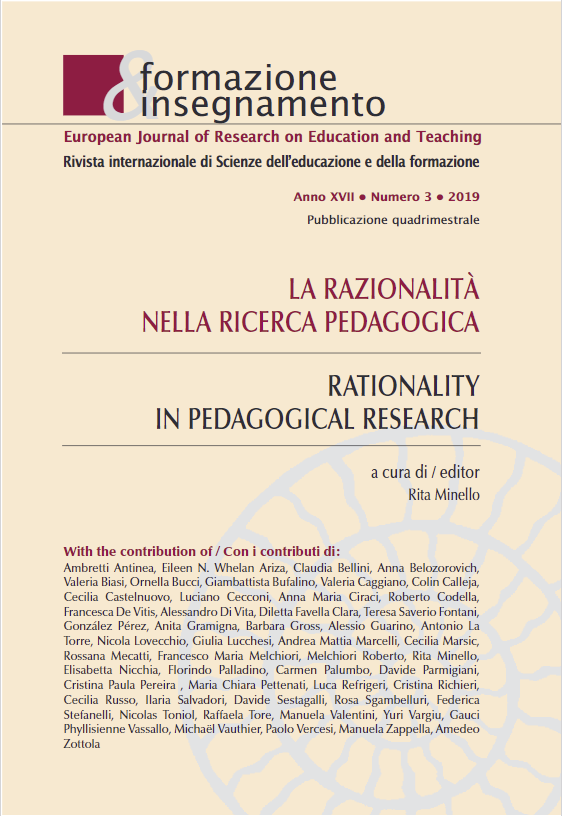Formative assessment as a strategy of learning
DOI:
https://doi.org/10.7346/-fei-XVII-03-19_32Abstract
In this period, the higher education systems are committed to a thorough reform to optimize the quality of learning and to identify functional skills to increase employability and to participate actively in community (Ministerial Conference Yerevan, 2015; Felisatti, Serbati, 2017; Boffo, Fedeli, 2018). In this context it is essential to offer students the opportunity to build learning ability together to allow the acquisition of an increased degree of understanding, thanks to the support of the teacher (Venet, Correa Molina, Saussez, 2016; Cinque, 2013; Vygotski, 1931/2014; Chauvigné, Coulet, 2010). In this perspective, the paper presents a case study that concerns a group of students attending the course of pedagogy and special didactics for professional education at the University of Cagliari. The analysis of the context has led to the following reflections: What activities should the teacher present to help students achieve the programmed learning objectives? How can the teacher assess the expectation of learning goals? How can you implement the feeling of competence in learners? How can you give students the possibility of controlling their learning? (Magnoler, 2018; Coggi, 2016; European Commission, 2008; Semeraro, 2006). The hypothesis proposes to put in coherence the objectives of the course with the methods and the evaluation process (Biggs, 1996; Peretti, Tore 2016). In this regard, the teacher of the course shared with the students the teaching form elaborated according to the objectives indicated in the Dublin Descriptors (Tore R., 2017; Ciavaldini-Cartaut 2016). It also provided the methods (Bonaiuti, 2017; Ramsden, 2002) for the study work and shared with the students the use of the formative assessment which favoured and positively anticipated the results of the final exam (Coggi, Ricchiardi, 2018; Poumay, 2014; Cajola, Domenici, 2005; Romainville, Coggi, 2011; Rapport du Canada, 2005; Leone, Moretti, 2010).
Downloads
Published
How to Cite
Issue
Section
License
Copyright (c) 2019 Pensa MultiMedia

This work is licensed under a Creative Commons Attribution 4.0 International License.
Formazione & insegnamento is distributed under Attribution 4.0 International (CC BY 4.0).
For further details, please refer to our Repository & Archiving Policy, as well as our Copyright & Licensing Terms.





